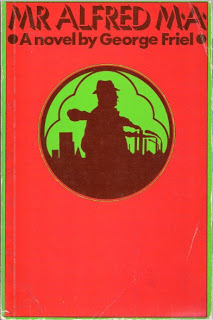Monday, March 02, 2015
Journey Through a Small Planet by Emanuel Litvinoff (Robin Clark Limited 1972)
Thursday, December 25, 2014
Goalkeepers Are Different by Brian Glanville (Crown Publishers 1972)
Friday, June 22, 2012
The Locked Room by Maj Sjöwall and Per Wahlöö (Harper Perennial 1972)
Tuesday, November 02, 2010
Mr Alfred M.A. by George Friel (Calder & Boyars 1972)

He saw a new rash break out on the scarred face of the city. Wherever the name of a gang was scribbled the words YA BASS was added. The application of the phrase caused some dispute at first. Nobody doubted YA BASS meant YOU BASTARDS. But the grammarians who discussed it were undecided about its vocative or apostrophic use. Some said COGS YA BASS meant O COGS! YOU ARE BASTARDS! Others said it meant WE ARE THE COGS, O YOU BASTARDS! A fifteen-year-old boy charged with assault and breach of the peace, and also with daubing TONGS YA BASS on a bus-shelter, said in court that YA BASS was an Italian phrase meaning FOR EVER. But the sheriff didn't believe him.
Some of the intelligentsia seemed to believe him.
Following a fashion, as the intelligentsia often do, they wrote the names of miscellaneous culture-heroes in public places and added YA BASS. Thus soon after the original examples of COGS YA BASS, TOI YA BASS, TONGS YA BASS, FLEET YA BASS, and so on, which were plastered all over the districts where those gangs lived, a secondary epidemic occurred on certain sites only. SHELLEY YA BASS suddenly appeared in the basement of the University Union. In a public convenience near the Mitchell Library MARX YA BASS was scrawled in one hand, LENIN YA BASS in another, and TROTSKY YA BASS in a third. When The Caretaker was put on at the King's Theatre PINTER YA BASS was pencilled on a poster in the foyer. BECKETT YA BASS, later and more familiarly SAM YA BASS, was scribbled on the wall of a public-house urinal near the Citizens' Theatre the week Happy Days was on. When the same theatre presented Ghosts somebody managed to write IBSEN YA BASS in large capitals on the staircase to the dress-circle.
Monday, July 26, 2010
Hillbilly Women by Kathy Kahn (Avon Books 1972)

When all this murdering and killing happened over at Evarts, that was when the coal company hired gun thugs and they met up with the miners that was out on strike. Well, Dad took the blame for those killings. Course, he'd been a coal miner all his life and they'd worked him day and night in those mines. And he worked with the union to make things better for the people.
But Dad wasn't at Evarts when the killings happened. He was out robbing the commissary. But Dad's brother, Sam Hicks, was there at Evarts. I think he was the one that had the machine gun. But all this time, Dad was robbing the company store.
I think it was in the spring of the year, long about '31. Dad and the other miners had come out on strike and the gun thugs were after them.
I remember Dad coming to the house and getting the shotgun and a lot of shells. He made us all get under the floor and told Mommy to keep us barricaded under there and not let us out. And I remember Mom a-beggin' him not to go out. But they had been working him hard in those mines, night and day. So he went out and joined the other miners on strike.
so anyway, this night he come in after the shotgun, that was the night before the killings at Evarts started. But Dad, the reason he wanted the gun was some of the miners and their families was starving and they needed some food. He aimed to get it for them.
Dad went up to the commissary and took about five other men with him. He went into the commissary and held his shotgun on the company men. Then he told the miners to fill all these bags full of food. They filled hundred pound bags of beans, sugar, lard, coffee, and taters. While he was holding the gun on the company men, Dad said what time he was around organizing with the union there wasn't going to be no people going hungry . . . The men took the food out and distributed it according to the size of the families that was out on strike.
Wyoming Wilson speaking to Kathy Kahn.

